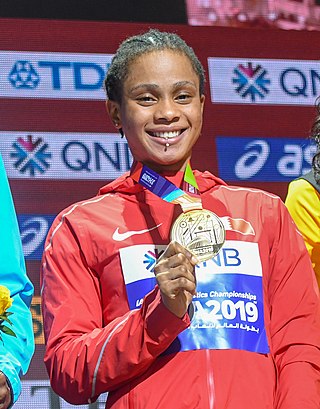
Track and field is one of the sports at the quadrennial Military World Games competition. Track and field competitions have been held at every one of the eleven editions of the Military World Games, which was inaugurated in 1995. [1]

Track and field is one of the sports at the quadrennial Military World Games competition. Track and field competitions have been held at every one of the eleven editions of the Military World Games, which was inaugurated in 1995. [1]
| Games | Year | Host city | Host country | Events |
|---|---|---|---|---|
| I | 1995 () | Rome | Italy | 30 |
| II | 1999 () | Zagreb | Croatia | 32 |
| III | 2003 () | Catania | Italy | 35 |
| IV | 2007 () | Hyderabad | India | 36 |
| V | 2011 () | Rio de Janeiro | Brazil | 35 |
| VI | 2015 () | Mungyeong | South Korea | 40 [2] [3] |
| VII | 2019 () | Wuhan | China |

60 metres, or 60-meter dash, is a sprint event in track and field. It is a championship event for indoor championships, normally dominated by the best outdoor 100 metres runners. At indoor events, the 60 metres is run on lanes set out in the middle of the 'field', as is the hurdles event over the same distance, thus avoiding some of the effects of the banked track encircling the venue, upon which other track events in indoor events are run. At outdoor venues it is a rare distance, at least for senior athletes. The format of the event is similar to other sprint distances. The sprinters follow three initial instructions: 'on your marks', instructing them to take up position in the starting blocks; 'set', instructing them to adopt a more efficient starting posture, which also isometrically preloads their muscles. This will enable them to start faster. The final instruction is the firing of the starter's pistol. Upon hearing this the sprinters stride forwards from the blocks.

Golden Spike is an annual athletics event at the Městský Stadion in Ostrava-Vítkovice, Czech Republic as part of the IAAF World Challenge Meetings. It was first organized in 1961.

The 10-second barrier is the physical and psychological barrier of completing the 100 metres sprint in under ten seconds. The achievement is traditionally regarded as the hallmark of a world-class male sprinter. Its significance has become less important since the late 1990s, as an increasing number of runners have surpassed the ten seconds mark. The current men's world record holder is Usain Bolt, who ran a 9.58 at the 2009 IAAF World Championship competition.

The IAAF World Challenge was an annual, global circuit of one-day track and field competitions organized by the International Association of Athletics Federations (IAAF). First held in 2010, it replaced the IAAF Grand Prix and IAAF Super Grand Prix series to form the second tier of international one-day meetings, after the IAAF Diamond League. Unlike the Diamond League, the IAAF World Challenge comprised stand-alone meetings, and no overall winners are crowned. The series was made defunct at the end of 2019 and was replaced by the World Athletics Continental Tour, which includes series winners for non-Diamond League events.

Mariya Aleksandrovna Lasitskene is a Russian athlete who specialises in the high jump. She is the 2020 Olympic champion and three-time world champion. With her victory in Tokyo, Lasitskene became the fourth female high jumper in history to win gold at both the Olympic Games and the World Championships.

Salwa Eid Naser is a Nigerian-born Bahraini sprinter who specialises in the 400 metres. She was the 2019 World champion with the third fastest time in history of 48.14 seconds, becoming the youngest-ever champion in the event and also the first woman representing an Asian nation to win that event at a World Championships. The mark places her only behind contested results of Marita Koch and Jarmila Kratochvílová. Over the distance, at only 19, Naser was the 2017 World silver medallist. She has also won, as a member of the Bahraini mixed-gender 4x400 m relay team, the 2019 World Championships bronze medal.